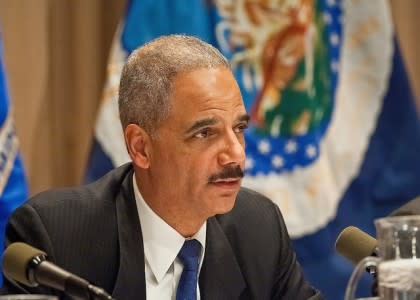Daily Update: Holder wants drug sentence changes, NYC loses stop-and-frisk ruling
Attorney General Eric Holder wants to change how some nonviolent drug offenders are sentenced in federal cases; the city of New York has lost a key ruling about its stop-and-frisk policy.
Monday, August 12, 2013
Items To Watch
1. Attorney General Eric Holder will unveil on Monday plans from the Justice Department to change how it prosecutes some nonviolent drug offenders, so they would no longer face mandatory minimum prison sentences.
2. A federal District Court judge has found that the stop-and-frisk tactics of the New York Police Department violates the constitutional rights of New Yorkers, and she as called for a federal monitor to oversee broad reforms. The ruling was in the case of Floyd v. City of New York.
Here are links to the ruling, in two parts: Part 1 | Part 2
Developing Questions …
Here are some updates on new discussions about top-of-mind constitutional issues.
1. Citizens United, revisited?
At the Balkinization blog last month, David Gans of the Constitutional Accountability Center wrote about an amicus brief the center filed for Harvard Law School’s Lawrence Lessig in McCutcheon v. FEC.
That’s the case set for argument in October in the Supreme Court about whether every-two-year limits on contributions to candidates and to non-candidate committees in elections are unconstitutional, a challenge from the Republican National Committee to obtain greater freedom for donors to make contributions to candidates and parties, which was rejected by a special court in Washington, D.C.
In 2010, in Citizens United, the Supreme Court ruled that the Constitution gives corporations the right to spend unlimited sums of money on independent expenditures related to political campaigns, in part because the interest of the government in preventing corruption is limited to quid-pro-quo corruption. Relying on that definition of corruption, the Republican National Committee argues that current federal overall contribution limits cannot be justified by the government’s anti-corruption interest.
Lessig presents research on Founding-era discussions of corruption in debates about the Constitution, which in his view shows that the Framers’ understood corruption in institutional terms: They were concerned about “improper dependence,” he contends, not “quid pro quo corruption”—dependence on outside forces including foreign princes overseas and powerful factions at home.
Of 325 uses of the term corruption in the debates, an appendix to the brief shows, 57 percent came in discussions of institutional corruption as opposed to two percent about corruption of individuals. The CAC/Lessig brief is one of dozens submitted in the case.
2. Can bracelets that raise awareness about breast cancer be banned from schools?
In the annals of the First Amendment, there is a long list of unappealing plaintiffs who have forced courts to make law favoring free expression: The American Nazi Party members who marched in Skokie, Illinois; the Westboro Baptist Church members who protest at funerals of American soldiers killed in action; and others.
Brianna Hawk and Kayla Martinez, from Easton, Pennsylvania, have now joined a different list—of appealing plaintiffs who have challenged courts to make law favoring free expression.
In October 2010, the Easton school district banned them from wearing bracelets that are part of a national campaign to raise awareness about breast cancer. The bracelets said, “I ♥ boobies! (KEEP A BREAST).” Relying on authority the district contended the Supreme Court has said schools have, the district ruled that the message on the bracelets was inappropriate and might lead to displays that were more egregiously sexual and disruptive. A federal trial court overturned the district on grounds that it had violated the students’ rights to free speech and issued a preliminary injunction against the ban.
Last week, in a deeply divided decision by the full U.S. Court of Appeals for the Third Circuit, the majority affirmed the trial court. The nub of its ruling was that “speech that does not rise to the level of plainly lewd and that could plausibly be interpreted as commenting on political or social issues may not be categorically restricted. Because the bracelets here are not plainly lewd and because they comment on a social issue, they may not be categorically banned …”
The school has not decided whether to ask the Supreme Court to review the Third Circuit ruling.
Milestones
It was on this day in 1898 that the Spanish-American War ended when Spain agreed to a peace pact that gave Cuba, Puerto Rico, and Manila in the Philippines to the United States. The formal treaty was signed in December.
Closing Notes
1. The official newspaper of China’s Communist Party continues its attacks on the U.S. Constitution. A blog has translated the third editorial in People’s Daily that trashes our Founding document. It compares Western “constitutionalism” to “climbing trees to catch fish” and it touts China’s “people’s democratic dictatorship.”
2. Twitter has registered to lobby the executive and legislative branches about copyright/patent/trademarks, consumers, foreign relations, and telecommunications. It is also setting up a federal political action committee.
Editor’s note: The Update is a summary of news and commentary about the Constitution and related issues, as reported around the digital world. Guest contributors and our editorial staff add to the daily update, and we welcome your suggestions (and reports) at editor@constitutioncenter.org.



